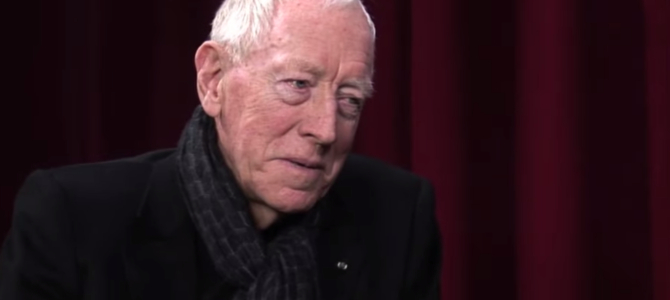
Max von Sydow has died at the age of 90, the legendary knight of Ingmar Bergman’s “The Seventh Seal” (1957), who played chess with Death and gave his life eventually to save a child. The film showed we are human because of this desire for eternity, in ourselves as long as we can, and in our children next.
But unless you happen to love Bergman, you probably know von Sydow because of Steven Spielberg, Martin Scorsese, or Ridley Scott. The movie legend became a part of Hollywood, a part of our desire to meet legends.
He was the mysterious, vaguely German-sounding doctor dealing with Leonardo DiCaprio in “Shutter Island” (2010), the director of the pre-crime program in “Minority Report” (2002), and Robin of Loxley’s father in “Robin Hood” (2010). He was the father figure in all these movies, a role he first undertook in the days of the action movies as Stallone’s father figure in “Judge Dredd” (1995). He was also the father in Wim Wenders’ “Until the End of the World” (1991), Dr. Kynes in the wonderful David Lynch “Dune” (1984), and Father Merrin in Billy Friedkin’s “The Exorcist” (1973).
Why We Needed the Wisdom of Von Sydow’s Characters
Hollywood saw in him this mysterious combination of grandeur and the corruption generated by our ambiguous attitude to the past. His very name, Carl Adolf von Sydow, is of the Prussian aristocracy, something we may admire as much as abhor.
So also with his screen presence and the dominant notes of his character: a combination of the authority of the old, of the pre-modern respect for elders, and the suspicion that their secrets will harm us. His characters always bear a burden that threatens to corrupt them and to destroy those they protect and guide. For better and for worse, they bear the secret of our mortality — which our beautiful action heroes, moral to the last and usually triumphant, might be crippled by, should they learn it. He is the Old World speaking to the New World about the inevitable failure of all human things.
Von Sydow was often cast as the avuncular or grandfatherly figure for that reason. Although only 44 when he made “The Exorcist,” he had already become older than any normal, modern, active man. Long before old age, he had age thrust upon him as his proper cinematic decoration. He would have to be what we fear we will become and what might reassure us at the same time — a serene, wise old man. He made it his work to summarize the power of poetic presentation, of storytelling, to make present the past and the future, to terrorize and then to comfort us.
It’s rare but not unheard of that character actors should become so important in cinema. Partly, the stars have faded to such an extent in our times that they can hardly open movies anymore. But partly, it’s what character actors have as their special prerogative. Their down-to-earth character is tied up with the fact that they represent types rather than spectacular individuals, and in caring about them, we open ourselves to the fundamental things they reveal about human nature. Von Sydow was for almost two generations what briefly was Richard Harris as Professor Dumbledore and Sir Ian McKellen as Gandalf.
How Von Sydow Taught Us Not to Fear Death So Much
I started thinking about von Sydow’s role in Hollywood and the meaning of his career last time I watched “Last Action Hero,” the John McTiernan action-comedy starring Arnold Schwarzenegger as a fictional version of himself. Had the movie been the work of any of the famous directors I mentioned in the beginning, it would be talked about as a sophisticated reflection on cinema and fiction, meta-narratives, and our neediness as audiences.
At the end, all of this comes into focus when inside a movie theater we see the still-young von Sydow wrestle with his mortality in Bergman’s masterpiece. Moments later, Death’s scythe protrudes through the screen, and the character steps out of Bergman’s and into McTiernan’s movie, where he is played by McKellan, who looks startlingly like the already-famous old von Sydow. He has to teach the boy Danny Madigan how to deal with the fear of death.
Like the knight trying to fend off death in Bergman’s story, Danny tries to do so in McTiernan’s, and he has found a knight of his own — the invincible, reckless, L.A. detective Jack Slater (Schwarzenegger), who is as vulgar as the knight was noble. Both sacrifice to save children. Of course, aristocratic Sweden and democratic America pull the soul in different directions but say the same thing: We need heroes who will face death fearlessly and keep their eyes on eternity.
That is what von Sydow did, and his roles as an aged oracle, unpredictably protective or treacherous, achieved the same thing in a different way. It’s remarkable how McTiernan put together the young knight and the old Death as the complete picture of von Sydow. It’s not just remarkable, but unique, and a fitting memorial of such a long-lived actor who shows up in so many different movies to persuade protagonists and audiences not to fear death so much. That’s as much of eternity as cinema can offer.
Beyond the more famous movies I’ve already mentioned, let me close with two recommendations for von Sydow admirers: “Steppenwolf,” Fred Haines’ 1974 adaptation of the Hermann Hesse novel, wherein von Sydow plays the protagonist Harry Heller, and “Three Days of the Condor,” the 1975 Sydney Pollack paranoid CIA thriller starring Robert Redford, in which von Sydow is wonderfully villainous as a European assassin with eccentric aristocratic pursuits.









